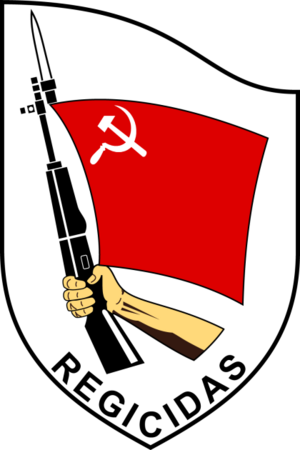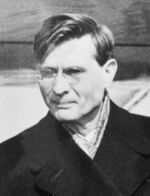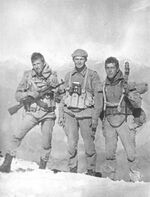Regicidas: Difference between revisions
No edit summary |
|||
| Line 23: | Line 23: | ||
|equipment= | |equipment= | ||
|equipment_label= | |equipment_label= | ||
|battles= | |battles= [[Operation Jerboam]]<br>[[Operation Meridian]] | ||
|anniversaries= | |anniversaries= | ||
|decorations= | |decorations= | ||
Revision as of 01:47, 5 April 2019
| Regicidas Special Operations Unit | |
|---|---|
 | |
| Active | 2nd December 1973 – present (66 years, 3 months) |
| Country | |
| Type | Special Operations Force |
| Role | Special operations HVT Raids Direct action Counter-terrorism Special reconnaissance Unconventional warfare Hostage rescue Foreign internal defence Counter-proliferation Counter narcotic operations |
| Size | Classified |
| Part of | Veleazan Special Forces Office (V-OF) |
| Nickname(s) | Astronauts Kingkillers |
| Engagements | Operation Jerboam Operation Meridian |
The Regicidas Special Operations Unit, commonly known as just Regicidas and abbreviated to either RSO or RGD are a Special forces unit that operate as the primary special operations force of the Veleazan Republican Forces. The Regicidas were founded in 1973 out of an necessity for participation in Operation Jeroboam and have since then grown in size and responsibilities. Initially under the control of the Veleazan Commissars Office, however the disestablishment of the communist government, it was placed under the control of the newly created Veleazan Special Forces Office, abbreviated to V-OF which also acts as an overall administrative head for the other special forces units in the overall Armed Forces and in which the Regicidas recruits it's members from.
The responsibilities of the Regicidas originally began solely on participating within Operation Jeroboam, a classified military operation during the Hisari Wars that repeatedly attempted to assassinate the Hisari Emperor, however it later developed into a larger operation comprising of smaller operations to destabilise Hisari operations and civilian life. Following Veleaz's withdrawal of from the war, the Regicidas conducted similar operations during the ASU Civil War, while also expanding in size to combat ASU Intelligence Services operating within Veleaz at the time. ost-war years saw the unit take on operations against counter-revolutionary movements within Veleaz, while also being deployed abroad in support of communist movements worldwide.
History

While officially founded in 1973, the first iteration of the Regicidas were a short-lived experimental program between the ASU's Red Army and Peoples' Navy in 1960. It was developed in an attempt to encourage cross-service cooperation, and to diminish the rivalries pervasive in the Union's Armed Forces. While this version of the Regicidas were disbanded, the unit was repurposed into an airborne training regiment. Upon the outbreak of the Hisari Wars in 1973, the ASU then attempted to take the war to the Hisari populace and government beyond simply overt conventional warfare. Then-Politburo Representative to the Armed Forces, Juan Carlos Mendoza, sought to destabilise the Hisari state from within through first encouraging then ordering a secret operation to eliminate the Hisari leadership, most importantly the Hisari Emperor. The Regicidas (then still known as the 10th Airborne School Regiment) was selected to take on the operation. This was due not simply just for its experience and specialized training in airborne warfare, but also the relative innocuousness of its position, which would thus prevent it being considered major assets by enemies. Code-named Araña, this newly-developed special forces entity began an exhaustive search for suitable members to admit into the Operation, and were given additional training to acclimatize to and survive the harsh conditions of the Hisari desert. On 2nd December 1973, the Regicidas in its modern form officially entered service.
